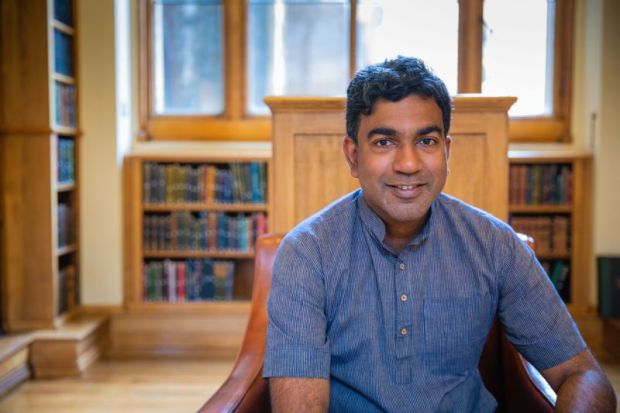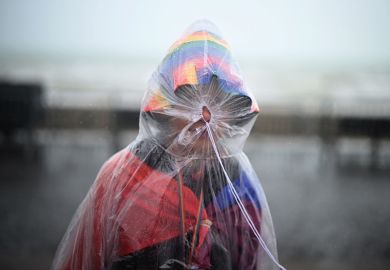Sujit Sivasundaram is professor of world history at the University of Cambridge. Born in Sri Lanka, he won a scholarship to study engineering at Cambridge in 1994 but decided to switch to history, going on to a PhD, a research fellowship and a role as teaching officer at Gonville and Caius College before securing a lectureship at the London School of Economics. He returned to Cambridge in 2010, where he is now also director of the Centre of South Asian Studies. His book Waves across the South: A New History of Revolution and Empire won this year’s British Academy Book Prize for Global Cultural Understanding.
Where and when were you born?
Colombo, Sri Lanka, June 1976. It was six years before the oft-cited start date of the island’s ethnic conflict. Indeed, though I was unscathed, I vividly remember the events of July 1983, when an anti-Tamil pogrom ripped through the city.
How have your early experiences shaped your research interests?
I have a mixed ancestry, including several of Sri Lanka’s communities. Yet I have a Tamil surname. This paradox shaped quite a lot of my childhood. I had all of my education until the age of 16 in the Sinhala language, the language of the majority, because it was not always safe to speak Tamil on the streets of Colombo or even to have an accent that hinted at a Tamil ancestry. I have maintained a sustained interest in the idea of race and its relation to colonialism and post-colonialism. I have also written, more recently, on the intersections between the idea of race and conceptions of animals and the environment. It is telling that Sri Lanka’s ethnic conflict was fought between a people who saw their origin from a lion – the Sinhalese – and those who represented themselves through the icon of the tiger – the Tamil Tigers.
Why did you decide to switch from engineering to history once you reached Cambridge?
As a Sri Lankan student from a state finding its path through post-colonial developmentalism, it took some courage to switch into the humanities and social sciences and to appreciate their value in our world. Hearing brilliant lectures in history and philosophy of science at Cambridge grabbed my attention. I didn’t realise that I was being taught by some of the best scholars at Cambridge: James Secord, Simon Schaffer and John Forrester. Among the highlights from these three in turn: how ideas of evolution came to popular attention through frenzied interest in West African gorillas as the missing link between humans and animals in the mid-19th century; how ordering stars and ordering society were interlinked in the early modern era; and how it was philosophically possible in the past to move from a singular case or set of cases to a theory such as that of racial difference. After such an intellectual feast, there was no chance I would be an engineer.
Why do you say in your book that the ‘quarter of this planet’ represented by the Indian and Pacific oceans been ‘forgotten in the histories told in the West’?
Waves across the South is an experiment in taking one of the most long-standing labels of historical periodisation, “the age of revolutions” – an era that is seen to have helped consolidate our system of nation states and our commitments to rights, belonging, reason and modern warfare, among other themes – to the Indian and Pacific oceans. These places are not seen to be as significant as the Atlantic and the West to the changes of the late 18th and early 19th centuries. Additionally, people who live facing these oceans in small islands can also suffer scholarly marginalisation because of the dominance of Western interests in continental land masses and areas of geostrategic significance.
What does it mean to offer ‘an environmental lens’ on imperial history?
I argue that the age of revolutions led to a detached commitment to scientific reasoning, which saw even the Earth modelled as a plane for the navigation of ships for free trade. In practice, this meant that it was possible to manipulate nature anew and convert it to data as well as resource in more profound ways. It also led to the erasure of the indigenous person as collaborator or informant. However, nature is powerful and, as I argue in the book, waves could disrupt the passage of scientific projects, such as the building of lighthouses or the observation of gravitational acceleration close to the equator.
What did winning the British Academy prize mean to you?
As a historian, I live by the value of critique, so a prize is an unexpected treat. I also hope that it makes space for indigenous scholars from the Pacific and Indian oceans to explore this moment in global history in new ways so that the story I tell is further developed or dismantled by future generations.
If you were universities minister for a day, what policy would you immediately introduce?
I would give every member of university staff a £1,000 grant to make it possible to undertake a small research project; I would co-opt the funds from the research council pot for extra-large research grants, which to my mind concentrates money too narrowly.
What one thing would improve the quality of your working day?
If all email communication were switched off by rule for about three-quarters of a working day to allow time for thinking, research and teaching.
matthew.reisz@timeshighereducation.com
Appointments
Andrew Deeks has been appointed vice-chancellor of Murdoch University. Currently president of University College Dublin, he will join the Perth institution in April 2022, succeeding Eeva Leinonen, who headed to the Republic of Ireland herself as president of Maynooth University. A Perth-educated civil engineer, Professor Deeks moved to the UK as pro vice-chancellor for science at Durham University in 2009 before joining UCD in 2014. He said his ambition was for Murdoch “to be recognised globally as a model for the 21st-century university, where a diverse and inclusive environment for learning, research and scholarship enables all members of the university community to achieve their full potential”.
Universities UK chief executive Alistair Jarvis is joining the University of London as pro vice-chancellor for partnerships and governance. Mr Jarvis, who has led the UK sector’s main representative body since 2017, will take up his new role in June. He previously served as UUK’s deputy chief executive and director of external relations, and before that was director of communications and marketing at the University of Birmingham. London vice-chancellor Wendy Thomson said Mr Jarvis’ “wealth of experience and the high regard with which he is held in the sector make him an outstanding appointment to this position”.
Mark Power has been confirmed as vice-chancellor of Liverpool John Moores University on a permanent basis. Formerly the university’s registrar, he has held the post on an acting basis since 2018.
Oliver Pybus is joining the Royal Veterinary College as vice-principal for research and innovation. He is currently professor of evolution and infectious disease at the University of Oxford.
Vicki Nairn has been appointed vice-principal (operations) at the University of the Highlands and Islands, overseeing professional services at the institution. She is currently vice-principal (corporate operations) at Robert Gordon University.
Laurence Romani has been appointed professor of management at the Stockholm School of Economics.
Register to continue
Why register?
- Registration is free and only takes a moment
- Once registered, you can read 3 articles a month
- Sign up for our newsletter
Subscribe
Or subscribe for unlimited access to:
- Unlimited access to news, views, insights & reviews
- Digital editions
- Digital access to THE’s university and college rankings analysis
Already registered or a current subscriber? Login








